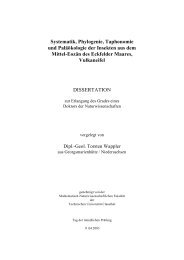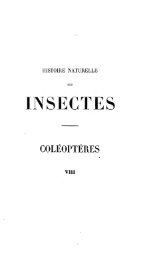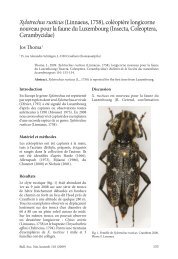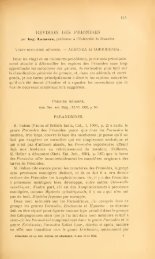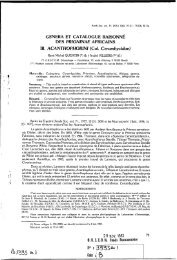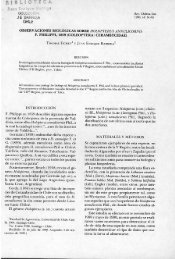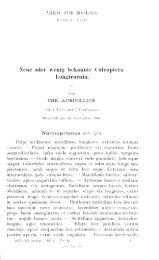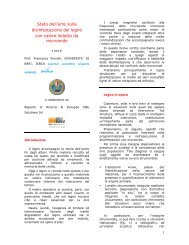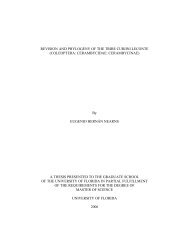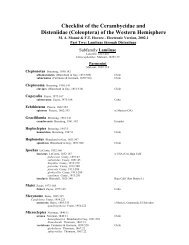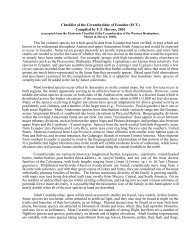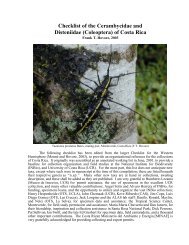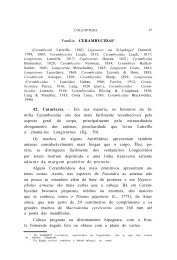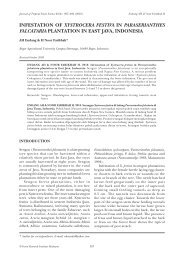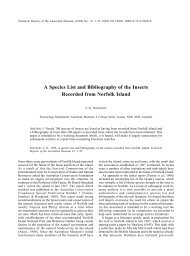Crustacea: Copepoda - Cerambycoidea.com
Crustacea: Copepoda - Cerambycoidea.com
Crustacea: Copepoda - Cerambycoidea.com
You also want an ePaper? Increase the reach of your titles
YUMPU automatically turns print PDFs into web optimized ePapers that Google loves.
Medetera flavipes Meigen - Reared from detritus-filled hole at end of dead branch on horse<br />
chestnut. Southern England; also Midlothian.<br />
Medetera freyi Thuneberg – ?RDBK. Reared from decaying aspen Populus tremula in<br />
Inverness-shire in 1998.<br />
Medetera impigra Collin* - Reared from larch, spruce, grey poplar, hornbeam, beech, ash<br />
and elm - in galleries of Scolytus scolytus. Has also been reared from the fruiting body<br />
of the wood-decay fungus Daldinia.<br />
Medetera infumata Loew - RDBK. Reared from pine.<br />
Medetera inspissata Collin - RDB3. Reared from various poplars, including decaying sap<br />
under bark, in Suffolk, Cambridgeshire and Somerset; develops under bark of fallen<br />
aspen in north-east Scotland.<br />
Medetera jacula (Fallén)* - On sycamore, beech, birch, ash, poplar and pine.<br />
Medetera jugalis Collin - Nationally Scarce. Poplars.<br />
Medetera melancholica Lundbeck - RDB3. On the continent reared from pine as well as ash<br />
and grey alder.<br />
Medetera micacea Loew<br />
Medetera muralis Meigen* - Adults found on oak, pine & holly.<br />
Medetera nitida (Macquart) - Status not known. British status unclear due to past confusion<br />
with M.bispinosa which was only resolved in 1996.<br />
Medetera obscura (Zetterstedt) - Nationally Scarce. Has been reared from elm log debris,<br />
and pupae under pine bark.<br />
Medetera oscillans Allen - RDB3. Has been reared from grey poplar bark.<br />
Medetera pallipes (Zetterstedt) - Adults reported at oozing sap of a wound on horse chestnut.<br />
Medetera parenti Stackelberg – RDBK. Reared from bark and sappy material from grey<br />
poplars.<br />
Medetera petrophila Kowarz - Nationally Scarce. Reported on birch.<br />
Medetera petrophiloides Parent* - Found on oak.<br />
Medetera pinicola Kowarz - Nationally Scarce. Reared from bark beetle tunnels in pine<br />
logs. Associated in N.America with various conifer scolytids including Dryocoetes<br />
autographus.<br />
Medetera saxatilis Collin* - Adults reported from poplar & oak.<br />
Medetera setiventris Thuneberg – ?RDBK. Discovered in a Malaise trap in a Speyside native<br />
pinewood in 1985. On the Continent (Finland and Russia) reared from scolytid<br />
galleries in spruce and pine, with Hylurgops palliatus, Pityogenes chalcographus,<br />
P.quadridens and P.bidentis.<br />
Medetera striata Parent - Of doubtful occurrence in Britain owing to confusion with M.<br />
fasciata.<br />
Medetera tristis (Zetterstedt) - Reported on beech and pine deadwood.<br />
Medetera truncorum Meigen* - A very <strong>com</strong>mon species in Britain, on a wide range of<br />
broadleaved trees. Established in N.America where has been reared from Prunus bark<br />
and dead maple.<br />
Medetera unisetosa Collin - RDB3. Biology unknown. Only recorded from New Forest,<br />
Wiltshire and Westerness.<br />
Medetera veles Loew – RDBK. Scotland.<br />
Systenus - All species have been reared from sap exudations on deciduous tree wounds or<br />
from moist tree-hole debris; larvae predators of larvae of rot-hole dwelling<br />
ceratopogonid midges.<br />
Systenus bipartitus (Loew) - Nationally Scarce. Associated with a variety of broadleaves,<br />
including elm, beech, horse chestnut and sycamore.<br />
Systenus leucurus Loew* - Nationally Scarce. In wide range of broad-leaved trees.<br />
105



